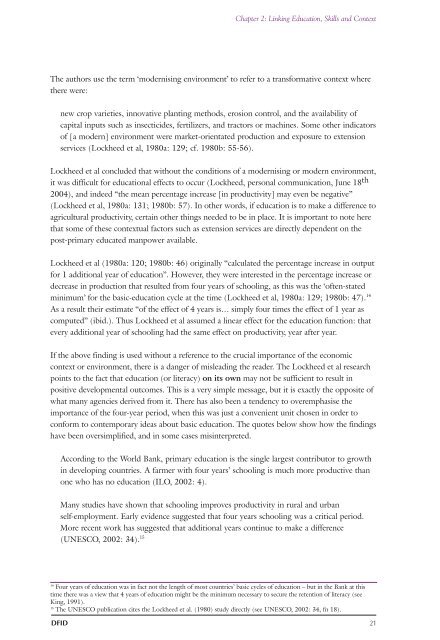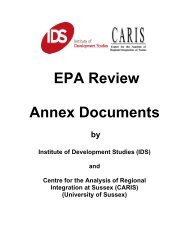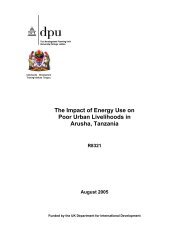Educating out of Poverty? A Synthesis Report on Ghana, India ... - DfID
Educating out of Poverty? A Synthesis Report on Ghana, India ... - DfID
Educating out of Poverty? A Synthesis Report on Ghana, India ... - DfID
You also want an ePaper? Increase the reach of your titles
YUMPU automatically turns print PDFs into web optimized ePapers that Google loves.
Chapter 2: Linking Educati<strong>on</strong>, Skills and C<strong>on</strong>text<br />
The authors use the term ‘modernising envir<strong>on</strong>ment’ to refer to a transformative c<strong>on</strong>text where<br />
there were:<br />
new crop varieties, innovative planting methods, erosi<strong>on</strong> c<strong>on</strong>trol, and the availability <str<strong>on</strong>g>of</str<strong>on</strong>g><br />
capital inputs such as insecticides, fertilizers, and tractors or machines. Some other indicators<br />
<str<strong>on</strong>g>of</str<strong>on</strong>g> [a modern] envir<strong>on</strong>ment were market-orientated producti<strong>on</strong> and exposure to extensi<strong>on</strong><br />
services (Lockheed et al, 1980a: 129; cf. 1980b: 55-56).<br />
Lockheed et al c<strong>on</strong>cluded that with<str<strong>on</strong>g>out</str<strong>on</strong>g> the c<strong>on</strong>diti<strong>on</strong>s <str<strong>on</strong>g>of</str<strong>on</strong>g> a modernising or modern envir<strong>on</strong>ment,<br />
it was difficult for educati<strong>on</strong>al effects to occur (Lockheed, pers<strong>on</strong>al communicati<strong>on</strong>, June 18 th<br />
2004), and indeed “the mean percentage increase [in productivity] may even be negative”<br />
(Lockheed et al, 1980a: 131; 1980b: 57). In other words, if educati<strong>on</strong> is to make a difference to<br />
agricultural productivity, certain other things needed to be in place. It is important to note here<br />
that some <str<strong>on</strong>g>of</str<strong>on</strong>g> these c<strong>on</strong>textual factors such as extensi<strong>on</strong> services are directly dependent <strong>on</strong> the<br />
post-primary educated manpower available.<br />
Lockheed et al (1980a: 120; 1980b: 46) originally “calculated the percentage increase in <str<strong>on</strong>g>out</str<strong>on</strong>g>put<br />
for 1 additi<strong>on</strong>al year <str<strong>on</strong>g>of</str<strong>on</strong>g> educati<strong>on</strong>”. However, they were interested in the percentage increase or<br />
decrease in producti<strong>on</strong> that resulted from four years <str<strong>on</strong>g>of</str<strong>on</strong>g> schooling, as this was the ‘<str<strong>on</strong>g>of</str<strong>on</strong>g>ten-stated<br />
minimum’ for the basic-educati<strong>on</strong> cycle at the time (Lockheed et al, 1980a: 129; 1980b: 47). 14<br />
As a result their estimate “<str<strong>on</strong>g>of</str<strong>on</strong>g> the effect <str<strong>on</strong>g>of</str<strong>on</strong>g> 4 years is… simply four times the effect <str<strong>on</strong>g>of</str<strong>on</strong>g> 1 year as<br />
computed” (ibid.). Thus Lockheed et al assumed a linear effect for the educati<strong>on</strong> functi<strong>on</strong>: that<br />
every additi<strong>on</strong>al year <str<strong>on</strong>g>of</str<strong>on</strong>g> schooling had the same effect <strong>on</strong> productivity, year after year.<br />
If the above finding is used with<str<strong>on</strong>g>out</str<strong>on</strong>g> a reference to the crucial importance <str<strong>on</strong>g>of</str<strong>on</strong>g> the ec<strong>on</strong>omic<br />
c<strong>on</strong>text or envir<strong>on</strong>ment, there is a danger <str<strong>on</strong>g>of</str<strong>on</strong>g> misleading the reader. The Lockheed et al research<br />
points to the fact that educati<strong>on</strong> (or literacy) <strong>on</strong> its own may not be sufficient to result in<br />
positive developmental <str<strong>on</strong>g>out</str<strong>on</strong>g>comes. This is a very simple message, but it is exactly the opposite <str<strong>on</strong>g>of</str<strong>on</strong>g><br />
what many agencies derived from it. There has also been a tendency to overemphasise the<br />
importance <str<strong>on</strong>g>of</str<strong>on</strong>g> the four-year period, when this was just a c<strong>on</strong>venient unit chosen in order to<br />
c<strong>on</strong>form to c<strong>on</strong>temporary ideas ab<str<strong>on</strong>g>out</str<strong>on</strong>g> basic educati<strong>on</strong>. The quotes below show how the findings<br />
have been oversimplified, and in some cases misinterpreted.<br />
According to the World Bank, primary educati<strong>on</strong> is the single largest c<strong>on</strong>tributor to growth<br />
in developing countries. A farmer with four years’ schooling is much more productive than<br />
<strong>on</strong>e who has no educati<strong>on</strong> (ILO, 2002: 4).<br />
Many studies have shown that schooling improves productivity in rural and urban<br />
self-employment. Early evidence suggested that four years schooling was a critical period.<br />
More recent work has suggested that additi<strong>on</strong>al years c<strong>on</strong>tinue to make a difference<br />
(UNESCO, 2002: 34). 15<br />
14 Four years <str<strong>on</strong>g>of</str<strong>on</strong>g> educati<strong>on</strong> was in fact not the length <str<strong>on</strong>g>of</str<strong>on</strong>g> most countries’ basic cycles <str<strong>on</strong>g>of</str<strong>on</strong>g> educati<strong>on</strong> – but in the Bank at this<br />
time there was a view that 4 years <str<strong>on</strong>g>of</str<strong>on</strong>g> educati<strong>on</strong> might be the minimum necessary to secure the retenti<strong>on</strong> <str<strong>on</strong>g>of</str<strong>on</strong>g> literacy (see<br />
King, 1991).<br />
15 The UNESCO publicati<strong>on</strong> cites the Lockheed et al. (1980) study directly (see UNESCO, 2002: 34, fn 18).<br />
DFID 21

















